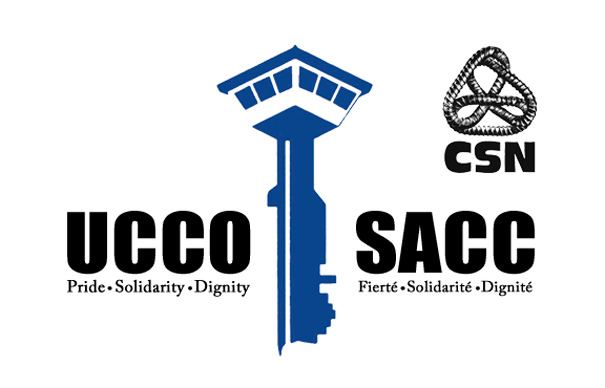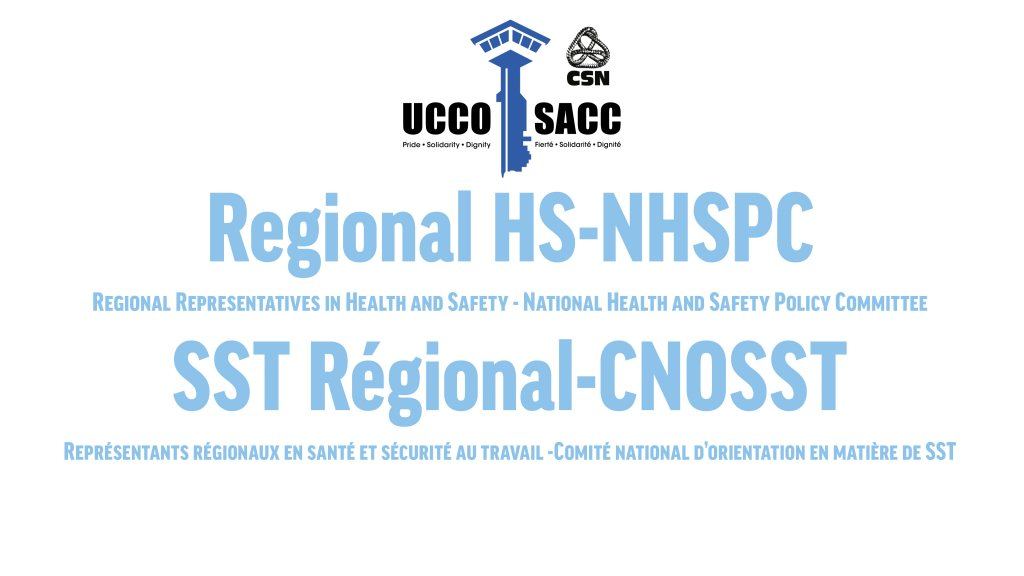Meeting of Regional Representatives in Health and Safety
The National Health and Safety Policy Committee was convened this past June 6, with regional health and safety representatives meeting in person to discuss the issues at stake.
Significant exposure to bodily fluids
According to information obtained from representatives, the statistics provided by the employer underestimate incidents of exposure to bodily fluids. This type of attack is on the rise again.
Whenever you are attacked in this manner, it is essential to report the incident to the employer and your local union branch as promptly as possible. We must ensure that the employer investigates the incident at work expeditiously and completes form LAB1070. In order to generate more reliable statistics, it is important to report such situations.
In addition, the Ontario UCCO-SACC-CSN region is attempting to arrange a meeting with MP Mark Gerretsen (Kingston) to revive the blood-sampling bill.
Vehicle fleet
The country’s vehicle fleet looks increasingly decrepit. This point will be discussed at the Safety Committee meeting on June 23. If you see vehicles in a sorry state with tie wraps or other signs of DIY repairs, take photos and send them to your regional OHS representative.
Distribution of medication
Representatives discussed regional and local differences in medication distribution across the country. The health sector is trying but failing to reproduce a community model in our institutions. Our role in the distribution of medication is to ensure access to the boxes containing medication, and that is all. Under no circumstances should we provide access to these boxes when the infirmary is open, and nursing staff are present. The health sector is working on new guidelines. We look forward to the official consultation on this matter. Being a CX is one job; being a nurse is another.
Institutional cleanliness
The representatives highlighted problems of cleanliness and hygiene in control zones, toilets, offices, gangways, and changing rooms. These areas must be kept clean at all times. The law is clear on this issue: our facilities must be cleaned regularly. The employer must stop relying on inmates to carry out tidying and cleaning tasks efficiently. Our regional representatives will collect comprehensive data for all sites in the weeks ahead.
Regional OSH representatives
Pacific: Chris Wright
Prairies: Brad Smith and Chase Mayer
Ontario: Martin McAllister
Québec: Frédérick Desjardins and Stéphan Dicaire
Atlantic: Dave Joudrey
National Health and Safety Policy Committee
Here is what the National Health and Safety Policy Committee discussed. The union’s regional OHS representatives and the national representatives for UCCO-SACC-CSN attended this meeting.
Respiratory program
The employer wishes to conduct a formal risk assessment of tasks and work environments in conjunction with an industrial hygienist, thereby enabling the employer to determine what protection factor is required for these tasks as well as what PPE. At present, SCBA is the required PPE. The employer cannot, however, explain the scientific reasons that led to this choice of PPE at the time.
Concurrently, the CSC sits on CSA Group subcommittees concerning the Z94.4 standard. Many federal, provincial, and municipal departments and agencies face the same challenges with the Z94.4 standard. This standard will be reviewed at a later date, but the review process is time-consuming.
The union has stressed the importance of this issue. Many of our members wear beards for religious or other reasons. The employer refuses to allow them to occupy certain positions because of the requirements of the CSC respiratory program and the Z94.4 standard.
The subject will be discussed again at the next meeting of the National OHS Committee meeting.
Prison Needle Exchange Program (PNEP)
Not surprisingly, we discussed PNEP once again. The union once again emphasized that overdose-prevention sites are a far better solution on all fronts than PNEP. The employer wishes to pursue the deployment of both models concurrently. We continue to comment on the program, guidelines, and work orders. In recent weeks, we have sent a report to the Minister of Public Security, Marco Mendicino, on the issues relating to harmful aspects of the needle-exchange program. Also, during our lobbying day with the Liberals, the Minister lingered at the kiosk, demonstrating the harmful effects of the needle-exchange program. The subject will be back on the agenda in September.
Brief updates
The Office of Informal Conflict Resolution gave a presentation on informal conflict resolution.
The employer has shared new guidelines for automated external defibrillators. We will assess and comment.
In solidarity,
Your Union Reps.

